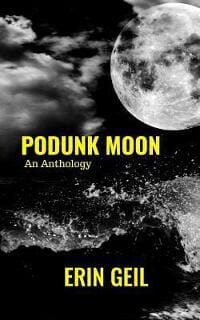Podunk Moon: An Anthology is a book of poetry by Morgantown, West Virginia native Erin Geil. Written over the course of 14 years, the range of subjects spans all over, from the death of a father, to broken relationships and all of the traumatic events experienced during her life in a “podunk” town in West Virginia.
Geil’s voice is very consistent throughout her poetry. There are some poems, like “Someone,” “Hot And Bothered Table For One?”, and “Wanting More,” which have an overt familiarity to their tone; they are the most direct poems you will find in Podunk Moon.
However, even in her most indirect poems, “Calico,” and “Once It Was Me” for example, there is still an undeniable sincerity in her writing. Whether the poem reads as a transparent rush of feeling, or as the feeling of moment frozen in writing. Geil pens them both with equal comfort and a confidence that comes across in her short, carefully punctuated lines and precise word choices.
There’s a deliberative rhythm to her work that endows each word with a little more gravity, and it persists even when the subject matter appears trite.
Geil’s writing is notably powerful when she is treating subjects larger than a single personal experience of hers in her poems. Some favorites of mine that address these types of topics are “Over An Ending,” “Nefarious X,” “No One Saves Us,” “Paying For Fame,” “Reptile Theory,” and “White Powder Smile.”
The diction and staccato pace of her poetry remains the same in these, but the way Geil can communicate an impression of an entire person’s life or the marginalization of a demographic is the most impressive part of these poems. It is what makes them an enjoyable read.
Much of Geil’s poetry in Podunk Moon deals with damaged relationships and their aftermath. These poems are very personal, and the openness Geil uses to express her thoughts and feelings towards past relationships is, at times, amazing.
In many of them it feels like you can almost hear the words being spoken because the poetry is so genuinely written. You can feel the resignation and the desire in “More Than Willing,” as well as the morose nostalgia of “The Leftovers Of Something Great.”
The most enjoyable poems in Podunk Moon are those which best capture the emotion of a specific moment. Thankfully, Geil provides plenty of these.
“Running Bricks,” “Tire in the Sky,” “A Country Bargain,” “Older Girl,” “Birds Danced On The Autumn,” “In A Crowd,” “There’s Nothing Left” and many more poems, scattered throughout the book, are some of Geil’s best work.
There is something of a trend among them where Geil skillfully swaps the effects of spatial and temporal changes to induce estrangement.
At the end of the poetry section of the book, Geil includes an excerpt of her upcoming thriller novel The Great American. After reading Geil’s poetry, her prose is refreshing. It gives new perspective to many of the events and topics that appeared in her poetry, but it is written with a much more casual tone.
It reads quickly and is full of dialogue and detail surrounding characters’ interactions. The chapters are short and the novel keeps the story moving at a very quick pace. The Great American has many of the same themes as Geil’s poetry does, including the macabre, vulgarity, and sex, but it engages them in a full narrative that hopefully comes to unite and connect them by the conclusion of the novel.



